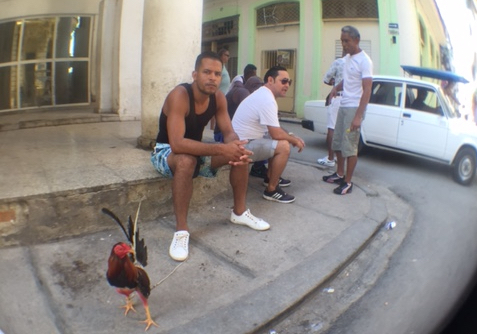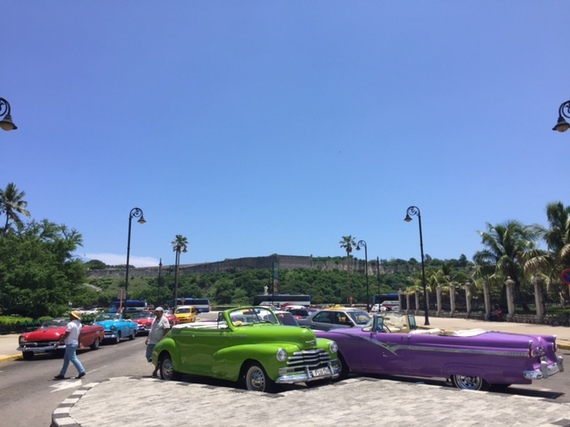A visit to Cuba has been very high on my list while in New York, and I made it in June. I would have loved to fly direct from the US, but this is only possible twice a week, so we had to do a stop-over. It was wonderful to be back in Cuba. The people. The hospitality, the rhum, the music, even the air embraces you. Things have changed, mostly for the better. Facades are being done up, classic American cars have been done up to serve as taxis for tourists. Lots of them haven't been done up, though, and they serve as taxis for the locals. Most buildings too, are in various states of disrepair.
Particularly the old part of La Habana is dilapidated, but the people definitely aren't. Cubans enjoy better health and education than most people in this world. Life expectancy for Cubans is actually slightly better than for Americans (79.4 and 79.1 years respectively according to UNDP's Human Development Index), under-five mortality per 1000 births is 6.2 in Cuba, 6.9 in the US. Adult literacy rate in Cuba is amongst the highest in the world (99.8%). That figure is not publically available in the US, so can't compare.
BeforeI visited Cuba over New Year's in 1984, 25 years after the revolution. There was money to go round, lots of sugar cane and oil, but little, bordering on no food, and I felt bad about not having brought some from home. The huge American cars didn't seem quite as vintage then. There were many small Eastern European cars, which really were no match for the climate. People were friendly, rhum and cigars abounded, and the music was inciting. Never have I felt so welcome. Travelling on my own absolutely didn't mean being lonely. Lots of partying on music and rhum to make up for the lack of food, I guess. At that time, government treated newly weds to three days paid honeymoon at a government beach resort, according to status, i.e. high-ranking government people stayed more luxuriously, "ordinary" Cubans less so, but still very nicely. Some said that this was part of the reason for many divorces and consecutive marriages in Cuba ... One day Fidel Castro appeared on TV in his army fatigues. I figured he was going to give one of his notoriously long political speeches, but no. El Commandante patted his left breast pocket and took out a cigar. He had recently stopped smoking, and the TV appearance was to publicly break down and admit to his compatriots, "Comrades, I didn't make it." And then he lit his specially hand rolled Cohiba. Only much later did he manage to quit.
ThenMy next visit to Cuba was some 14 years later, during the last years of what Cubans call the "special period" in the wake of the Soviet Union's collapse, which deprived them of everything they had relied on for over 30 years. The special period saw the fishing fleet fall apart. Oil and fuel was rationed. Sugar cane and tobacco is not food. People starved. By the time I visited the tide was turning. After almost 100 years of relying on first the US and later the Soviet Union for supplies of almost everything, the Cubans had to relearn agriculture. Local communities were being taught to grow little vegetable gardens for subsistence. If not exactly encouraged, private enterprise was, at least, legal. Families were allowed to open small restaurants, Paladars, in their home serving up to 12 tourists. They were also allowed to open small Bed & Breakfast private pensions. In the state restaurants waiters and waitresses were doctors, civil engineers, professors and the like. There were dollar shops where foreigners could spend their money. The people were still lovely, as was the music, the rhum, the beer and the cigars. The American cars rattled, huffed and puffed, but they still rolled. A very common sight was the legs of a man sticking out from a car, the upper part of the person buried under the bonnet or under the car, trying to patch it up just once more for the umpteenth time. NowThis time round people are still sticking out of old cars; convertibles have been completely renovated in bright, shining colours for tourists. What is more, many house facades in the beautiful old part of La Habana have been renovated, while the interior of many old buildings needs serious looking after. Many government buildings and old family mansions have been done up as museums, associations or for business. The local neighbourhood Committees for Defense of the Revolution (CDR) are still round every corner, upholding peace and reducing dissatisfaction (or perhaps only the expression of ...), I am told, issuing licenses for legal dogs to carry in public so as not to be caught and driven away by the local catcher of illegal dogs. Allegedly, Cuba enjoys full employment. Many people work together to carry out the slightest task; parks and streets are alive with people. Sidewalk-sitting is perhaps a job of sorts, where one can hang out with one's fighting cock waiting for a fight.  © Mette Holm
© Mette Holm
There's some way to go yet in the way of respect for human rights. Surveillance is massive, criticism and views that differ much from government's are unwelcome. The paid honeymoon has been abandoned. Paladars serve 50 guests or more, but investment laws, tax systems and the like are still inadequate. Private tourist businesses are common. There's lots more food now, and people are much better nourished, which is terrific. Art and culture flourish in both state museums and underground - and in between, like at Fabrica del Arte. This place is so full of life and energy, with local and international concerts in many genres, exhibitions, films, bars, restaurants, architecture, design, painting, sculpture, a fountain of expression.
The internet, however, is still absolutely undernourished and underenergised. The only place we found fully functioning wi-fi, fast and furious, was at the state conference hall where we attended the historic and exhilarating signing of the Colombian accord between the government and FARC, the Bilateral and Definitive Ceasefire, Cessation of Hostilities, and Laying Aside of Weapons. The accord sets out a roadmap for disarming and demobilising FARC after a final peace accord is signed, hopefully within months. It foresees a full turnover of guerrilla weapons to the UN within six months. We actually witnessed the beginning of the end of half a century's armed and very destructive conflict in Colombia, which has left 260,000 dead, 45,000 disappeared, and 6.8 million displaced people. As mentioned, the wi-fi connection was flawless, and I wrote to a Colombian friend where I was and what was going on. Her answer reflected the feeling of millions of Colombians:
"Oh my God Mette!!!! You witnessed perhaps the most important moment in history for my country of the last 50 years. I'm glad you had the opportunity to do so! How was the environment? What are your perceptions of the process? How were the speeches!"
The speeches were terrific! They were meaningful, sincere and hugely promising. The atmosphere was warm and full of promise. Cuba and Norway have been patrons of the process, Chile and Venezuela observers. The presidents of Colombia, Cuba, Chile, Venezuela were present, as was Norway's foreign minister, president of the UN General Assembly (my husband) and the UN Secretary General. Everyone stood while listening to Colombia's national anthem. The anticipation was tangible, almost physical, the relief and thrill when everyone had signed was like flood gates opening to a swell of happiness and applause. It was a rare and wonderful moment to witness. And we appreciated that moment even more in the evening while watching the beginning of the end of Europe as we know it with the English voting Britain out of EU. Terrifying and incredibly sad. Democracy at its worst - with populist politicians passionately leading the way into something they hadn't really thought through, letting down millions of Europeans. And hardly had the votes been counted before they started breaking promises and getting out ... Disgusting.
The risk of Europe falling apart makes the peace brokering in the Americas and rapprochement between Cuba and the US all the more welcome ... It has seemed senseless that such close neighbours have got along so poorly. It took a lot of effort to get there, and Pope Francis, the best of his kind in a long while, played his part.
Much as we love the Fidel Castro quote circulating on social media, attributed to him in the 1970es "The US will come to talk to us when they have a black president and the world has a Latin American Pope" we have no real way of checking it. But my husband asked Cuba's foreign minister whether Fidel actually said that. The FM answered: "I asked him. He says he doesn't remember." At least he didn't kill the story!
And whether or not it is true, at least the rapprochement is. The US is finally lifting some of the Cuba-sanctions that have long been condemned by most of the world. Cuba has been removed from the US list of state sponsors of terrorism, diplomatic ties have been reopened, John Kerry has visited Cuba, as has president Obama and his family. Now we're only waiting for the nasty Helms-Burton Act to be lifted. On this John Kerry stated during his visit last year:
"We are all aware that, notwithstanding President Obama's new policy, the overall U.S. embargo on trade with Cuba remains in place and can only be lifted by Congressional action -- a step we strongly favor."
I can only say, go Congress, go! Give Cuba and the Cubans room to manoeuvre in the 21st century, give them the chance they deserve, and please, please don't try to swallow them up once more in the process, so we have to go through all this bad neighbourliness again.

